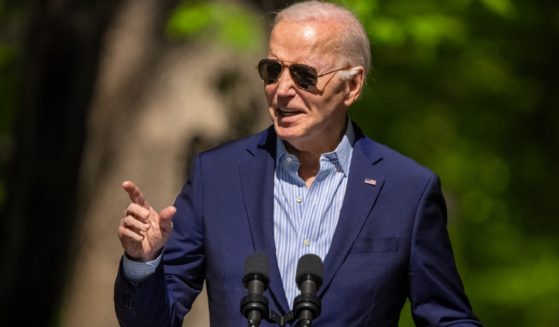South Korea Caves to Pressure from North Korea, Passes Controversial Anti-Free Speech Law
On Monday, South Korea’s parliament approved contentious legislation criminalizing the flying of propaganda leaflets by balloon toward North Korea, despite fierce criticism that the country is sacrificing freedom of expression to improve ties with the rival North.
The legislation passed with the support of 187 lawmakers, mostly governing party members who support President Moon Jae-in’s policy of engagement with North Korea.
Outnumbered opposition lawmakers didn’t attend the vote after their attempt at delaying the balloting with nonstop speeches was foiled by governing party lawmakers and their allies who used their three-fifths supermajority to halt the speeches in a separate vote.
It was the first time that South Korea’s parliament has passed a bill formally banning civilians from floating anti-North Korea leaflets across the tense border. South Korea has previously banned such activities only during sensitive times and has normally allowed activists to exercise their freedom of speech despite repeated protests from North Korea.
Activists and defectors from North Korea have for years used huge helium-filled balloons to carry leaflets criticizing North Korea’s nuclear weapons program and human rights record, USB sticks with information about world news, and U.S. dollars. Observers say North Korean leader Kim Jong Un likely saw the leafleting as a threat to his absolute rule over his 25 million people, who mostly have little access to outside information.
Lawmakers aligned with Moon say the legislation is intended to avoid unnecessarily provoking North Korea, to ensure the safety of people who live near the border, and to secure stable relations with the North. Opponents accuse Moon of sympathizing excessively with North Korea or yielding to North Korean threats over the leafleting.
“This is a law that will block the flow of South Korea’s great values, the spirit of democracy, freedom and equality, to North Korea,” conservative opposition lawmaker Tae Yongho said during a 10-hour speech.
“It’s a law aimed at joining hands with Kim Jong Un and leaving North Korean residents enslaved for good.”
Tae was a senior North Korean diplomat in London before defecting to South Korea in 2016 and was elected to South Korea’s parliament in April.
The bill will take effect three months after being promulgated by the government, which is regarded as a formality. A lawyers’ group in Seoul earlier said it would file a constitutional appeal if the bill is passed.
Under the legislation, anyone flying leaflets, auxiliary storage devices or money toward North Korea without government permission can be punished by up to three years in prison or a fine of 30 million won ($27,730).
The same penalty can also be applied to blaring loudspeaker broadcasts or placement of giant billboards at border areas, but no civilians in South Korea are known to have been involved in such activities.
Moon and Kim agreed to halt Cold War-style psychological warfare and lower animosities when they met in April 2018 at the start of now-stalled global diplomacy on North Korea’s nuclear program.
Moon’s government says that agreement must be applied to civilian leafleting, but opponents argue the accord didn’t clearly prohibit it.
The bill’s passage came six months after Kim’s powerful sister, Kim Yo Jong, responded furiously over what she called South Korea’s inability to halt civilian leafleting and demanded it ban the activity. She called North Korean defectors involved in the leafleting campaign “human scum” and “mongrel dogs.”
Moon’s government responded that it would introduce an anti-leafleting law and press charges against some activists. But an angry North Korea went ahead with a threat to blow up an unoccupied South Korean-built liaison office on its territory, in its most significant provocation in more than two years.
Tensions further rose in September when North Korean troops fatally shot a South Korean fisheries official found on a floating object in the North’s waters. Kim Jong Un later offered a rare apology for the killing.
After weeks of investigation, Seoul police last month requested that prosecutors indict nine leafleting activists for allegedly violating laws on inter-Korean cooperation, pollution and embezzlement.
Among them is Park Sang-hak, a North Korean defector who accused the Moon government of “meanly” passing responsibility for strained inter-Korean ties to him and fellow activists.
“The leaflets that we’ve sent were meant to inform our parents, brothers and sisters that we’ve found after our arrival here that South Korea isn’t a living hell or an American colony like we had been taught there,” Park said. “Is this that wrong?”
In 2014, North Korean troops opened fire at propaganda balloons flying toward their territory, triggering an exchange of fire that caused no known casualties.
It’s unclear whether the bill’s passage might promote ties between the Koreas.
After nuclear diplomacy stalled last year due to wrangling over U.S.-led sanctions, North Korea halted nearly all cooperation with South Korea.
It hasn’t responded to a South Korean offer of coronavirus-related cooperation. But observers say North Korea may push for reconciliation with South Korea again when it wants a new round of diplomacy with presumptive President-elect Joe Biden’s administration.
The Western Journal has reviewed this Associated Press story and may have altered it prior to publication to ensure that it meets our editorial standards.
Truth and Accuracy
We are committed to truth and accuracy in all of our journalism. Read our editorial standards.












